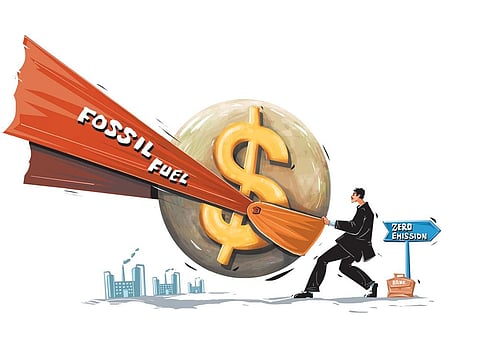

Climate change used to be the stuff of placards and protests outside company headquarters. Now, the action has moved into the boardrooms, as shareholders and investors demand definitive targets to reduce emissions. Times are indeed changing. BlackRock, the world’s largest asset manager with $9.6 trillion in assets, said in a statement this week, that at least three quarters of its investments in companies and governments will be tied to issuers with a scientific target to cut net greenhouse gas emissions to zero by 2050, up from 25% currently. It joined a group of money managers called the Net Zero Asset Managers Initiative (NZAMI)in March 2021 aiming to get to net-zero emissions across their assets. BlackRock however clarified that its “role in the transition is as a fiduciary to our clients. Our role is to help them navigate investment risks and opportunities, not to engineer a specific decarbonization outcome in the real economy."
It's happening not only in Europe and the US, but in the more conservative East. Reuters reports some big Japanese companies including Sumitomo Mitsui Financial Group, Tokyo Electric Power (Tepco) and Mitsubishi Corpwill face resolutions from activist shareholders urging greater commitment to tackling climate change at their annual meetings this year.
Some of the activist groups have pointed that the lifetime emissions from 10 proposed liquefied natural gas (LNG) power projects involving these companies are estimated to be 1.2 billion tonnes of carbon dioxide (Co2) – double that of Japan’s 2030 reduction target. Many of these company AGMs may reject these resolutions, but it is significant that the discussion has reached some of the most conservative boardrooms.
Even Reliance Industries’ Mukesh Ambani made the right noises when he told the Qatar Economic Forum last June that he is targeting his refining and other units reach net-zero carbon emissions by 2035.
The litigation weapon
The UN’s Intergovernmental Panel on Climate Change (IPCC) has estimated to limit global warning to 1.5 degrees Celsius above preindustrial levels, an average of 6 billion tonnes of carbon dioxide will have to be removed each year from the atmosphere by 2050. Currently, only a measly 10,000 tonnes of Co2 have been captured to date.
The new initiatives by the big corporates to limit greenhouse gases (GHG) and phase out the fossil fuel industries, is not exactly spurred by philanthropic objectives; it is to limit the looming costs being imposed by activist litigation. Over the last few months, the UN’s Intergovernmental Panel on Climate Change (IPCC) has released a series of startling reports, penned by the world’s most accomplished climate scientists, on how close we are to a man-made environmental disaster. The third and concluding report – Mitigation of Climate Change – released recently, validates litigation as a tool, to confront the fossil fuel industry and prod local governments.
The report says since 2015 nearly 40 cases have been initiated against those governments that violated UN-mandated targets. One of the cases cited is the groundbreaking judgment from the Hague District Court of the Netherlands in May 2021, which held Royal Dutch Shell PLC responsible for greenhouse gas emissions. What the IPCC report has done is to bring fringe litigation to center-stage as a credible tool against investments that threaten the environment. Hundreds of claims have been brought against banks, pension funds and investment funds for failing to disclose activities that pose a climate risk.
The battle against ‘Big Oil’
The frontline of the battle is now Europe and action is centered around what is known as ‘Big Oil’ – the multinational oil prospecting and refining companies. TotalEnergies SE has announced plans for a steep cut in methane emissions. Methane is considered one of the most harmful of greenhouse gases, and the French energy giant aims to reduce its release of methane by 80% this decade. Last May, stock investors ejected two Exxon Mobil Corp. directors seen as insufficiently aligned to the threat of climate change. The proposal was moved by a tiny fund with just a 0.02% stake.
However, as long as banks and investors are willing to finance the development of fossil fuels, the targets of zero-emission by 2050 will be difficult to achieve. Five years after the Paris Climate Agreement came into force in 2016, six US banks – J P Morgan, Chase, Citigroup, Wells Fargo, Bank of America, Morgan Stanley and Goldman Sachs – lent nearly $500 billion and underwrote to 100 corporations, aggressively expanding fossil fuel operations.
But opposition has moved from placard-waving agitators to shareholders like ‘Stop the Money Pipeline’ – a coalition of over 200 organizations and funds. They are initiating shareholder resolutions at the AGMs of these US banks and insurance companies. And the chips are stacked against those who refuse to change.
Big Oil
Frontline of the battle is now Europe and action is centered around what is known as ‘Big Oil’ - the multinational oil prospecting and refining firms
Net-zero emission goal
The new initiatives by the big corporates to limit greenhouse gases (GHG) and phase out the fossil fuel industries, is not exactly spurred by philanthropic objectives; it is to limit the looming costs being imposed by activist litigation